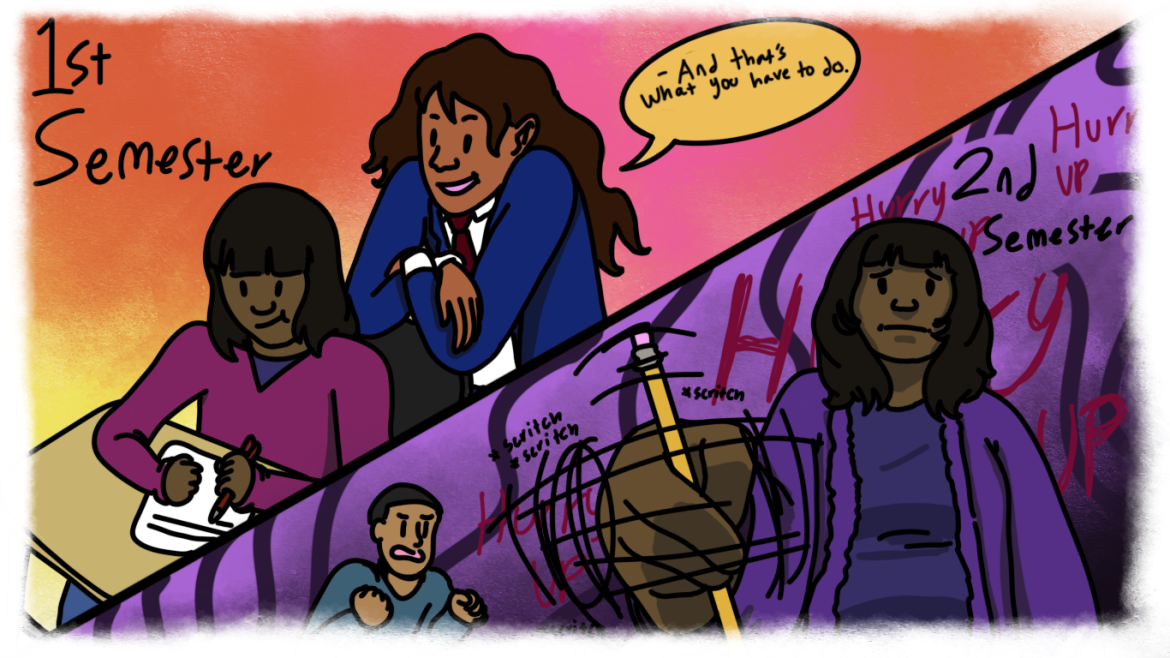An illustration shows a student working in the first semester versus the second semester. The second semester brings many additional stressors for students. “While it’s easy to write off a student’s grievances as trivial school complaints, the difficulty of this time period should be recognized and taken seriously,” Variety Editor Isabella Westrich wrote. Illustration by Antonio Starks
Many factors make the end of the second semester the hardest part of the school year for students.
The last half of the second semester is awful. Students come back from spring break, only to jump right into six weeks of deadlines, finals, exams, events and major pressure. They’re tired, they’re stressed and they’re just done.
While it’s easy to write off a student’s grievances as trivial school complaints, the difficulty of this time period should be recognized and taken seriously. In some classes, these stressors are partially due to the structure of the second semester. Advanced Placement classes must cover all content, plus make time for review before the AP exams, which happen as early as May 1, more than three weeks before school ends on May 24. This takes crucial time off of an already tight schedule.
“In the spring semester, there’s a lot of stuff that just hits the proverbial cutting board and is left off,” CCHS science department teacher and AP Chemistry teacher Matthew Regester said. “Students do get a different version of the course depending on if they take it in the fall or the spring. It’s not radically different, but there are subtle differences in terms of depth and stuff like that. I also can have a more relaxed pacing in the fall, so I think it’s more stressful for me and the students in the spring than it is in the fall.”
“Students do get a different version of the course depending on if they take it in the fall or the spring. It’s not radically different, but there are subtle differences in terms of depth and stuff like that.”
— Matthew Regester, Science Department Teacher
Another stressor of the second semester is its crucial nature to passing classes. At the end of both semesters, finals taking place at this time account for a sizable percentage of class grades, and along with the work done in the last grading period they can mean the difference between passing or failing for many students.
Additionally, for seniors, there are no more chances to take required classes after the second semester, so passing or failing one class can mean the difference between graduating or not graduating.
“This semester especially added so much pressure because I only have a month left now and I have to get a lot of work done and pass all my classes and get good grades,” CCHS Class of 2023 Alum Brandy Ruby Solis said.
The trickiness of this time is expounded on by rampant burnout.
“In mid-April and into May, that’s when we see real burnout and it does have a difference (in performance),” CCHS English department teacher Ian Altman said. “The students don’t necessarily just refuse to do work, at least not more than they did anyway, but they are noticeably tired in a way that they’re not in November.”
While it’s easy to write off a student’s grievances as trivial school complaints, the difficulty of this time period should be recognized and taken seriously.
By this time, students have been in school for eight months already, and it’s natural to be tired and burnt out. However, the negative impacts burnout has on performance come right when students need to be more on their game than ever, making this period even more difficult. Unfortunately, there’s no easy answer to any of these problems, as they come with the structure of our education system. However, parents and guardians should not dismiss student struggles as they are very real.
